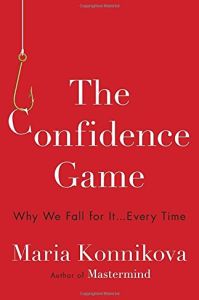Join getAbstract to access the summary!

Join getAbstract to access the summary!
Maria Konnikova
The Confidence Game
Why We Fall for It… Every Time
Viking, 2016
What's inside?
Think you’re too smart to fall for a scam? Given the right set-up, even the sharpest minds get fooled.
Recommendation
In this artfully written study of swindles, psychologist Maria Konnikova, relying on decades of research studies and news accounts, delves into the complex psychology of scams. She reports that under the right circumstances, even the sharpest minds can fall for a con artist’s trick. Konnikova is a facile writer who tells engrossing stories, though at times her instructive tales feel sadly repetitive: con artist, victim and then dismay. With these case histories, the author offers a unique look at an age-old question: Why do people keep falling for swindlers?
Summary
About the Author
Maria Konnikova, also the author of Mastermind: How to Think Like Sherlock Holmes, holds a doctorate in psychology from Columbia University.



















Comment on this summary